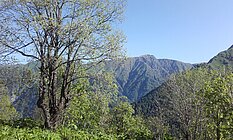Beechdiv
Biodiversity in deadwood - basis for improving the sustainable protection of beech forests in the Caucasus and in Germany

Beech forests dominate the temperate zone in Europe and the Caucasus. Germany lies at the heart of the European beech's global distribution. Post-glacial return migration and the history of use determined today's biodiversity here and thus also the conservation efforts for beech forest habitats. From Bulgaria to Iran, the European beech is replaced by the Oriental beech. Similar to Germany for the European beech, the countries of Georgia and Armenia bear a global responsibility for the diversity of Oriental beech forests. In order to be able to meet this responsibility, joint research on biodiversity in these forests is of great importance.
Main aims
The aim of this 3 year research project is therefore to initiate a mutual transfer of knowledge about biodiversity in beech forests between Germany and countries in the Caucasus in order to establish long-term research and protected area cooperation. This is to be achieved primarily through the qualification of a young scientist from the Caucasus in Germany, as well as through the qualification of local staff in the research institutes and protected area administrations in the Caucasus.
The project aims to demonstrate the importance of deadwood and unused forests for biodiversity in beech forests of both beech species. Furthermore, the responsibilities for endemics and highly threatened species of the respective regions will be identified. For this purpose, two hyperdiverse species groups on deadwood, namely fungi and beetles, will be studied. For these, standardized data will be collected in virgin forests and commercial forests in Armenia, Georgia and in Germany and these data will be comparatively evaluated together with already existing data. In addition, people will be trained in the topic as site managers in all participating protected areas in order to act as multipliers of the topic in the long term. For this purpose, an already loosely existing research and nature conservation network of the University of Würzburg and the Bavarian Forest National Park on the German side, the Borjomi National Park and the Lagodechi Wilderness Area in Georgia, as well as the Entomological Institute in Armenia are to be formalized and expanded in the long term within the framework of the proposed project.
Duration
starts 2021
Funded by
Bundesministerium für Bildung und Forschung - BMBF



